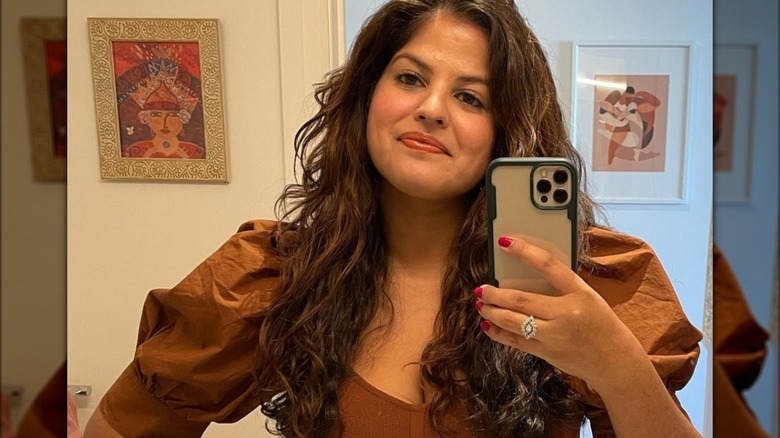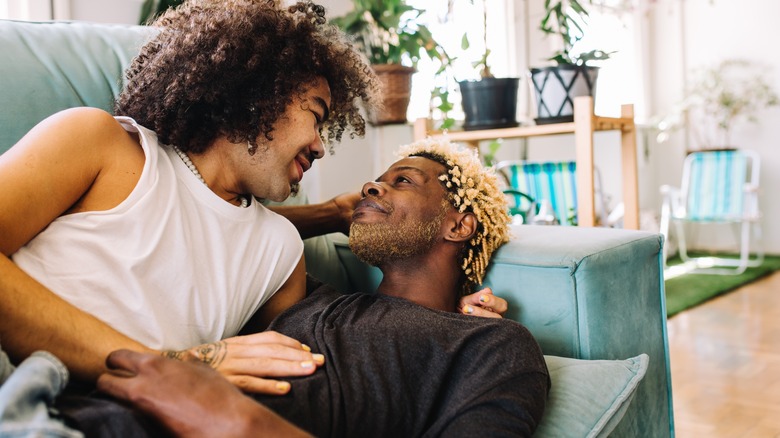When Is The Right Time To Tell Your Date About Chronic Health Issues?
Dating in 2023 is already full of obstacles, from texting etiquette to choosing the best dating app for your situation to a slew of pandemic-related issues. However, for those who have experienced chronic illnesses since before 2020, staying safe has been an ongoing struggle. For those who have chronic pain, remote attendance options for work, school, and beyond opened a whole new breadth of opportunity for learning and community-building. As Jessie Hadley-Stokes, who has MS, told CNN, "Quite a lot of us are used to this," referring to feelings of isolation that became commonplace during the pandemic. She added, "It's the chronic illness community now teaching those who are more able."
While immunocompromised folks are still very much living through a pandemic, the general population seems to have resumed business as usual. But in-person dating opens up a whole new set of questions for what a romantic partner may or may not be up for, and deciding when and how to talk to someone about the health struggles or chronic illnesses that affect your daily life can present its own challenges.
These overlapping communities can share notes
An estimated six out of 10 Americans have one chronic disease and four out of 10 have more than one, according to the CDC, which defines chronic disease as a condition lasting more than one year and requiring medical treatment. Chronic illness describes the experience that may come with living with chronic disease, and though not all chronically ill folks are disabled, there is a substantial overlap in these populations. Per the World Health Organization, "Disability results from the interaction between individuals with a health condition ... with personal and environmental factors including negative attitudes, inaccessible transportation and public buildings, and limited social support." As a whole, the disability justice movement is turning away from placing limits on community members in lieu of reflecting on their relationship to others and their environment.
Chronic illness advocate Nitika Chopra, who has a severe form of psoriatic arthritis, gave Well and Good suggestions for what to say when chronic illness gets in the way of your plans. "If you tell the person, 'I want so much to go to this and the only thing that would stop me is if my health isn't doing well,' right when you RSVP, then they are more likely to understand if you do end up not being able to make it in the future." It's also fair game to keep things vague if you have to cancel plans but aren't comfortable talking with that person about your health.
Always put your body first
One approach to sharing details about your health with a future date could mean clarifying potential physical boundaries you might experience from the get-to. Disability advocate Chelsea Bear wrote for Refinery29, "The best dates I've had so far are the ones where I'm completely myself, open and honest." She explained, "I've learned ways to talk about my disability that feel the most comfortable to me, whether that's through jokes to break the ice or casually weaving it into conversations."
Unlike Bear, a Cosmopolitan contributor — called "Emma" for the article — doesn't make a point of disclosing her disability before going on a date. "It feels so damaging, like you're saying there's something wrong," she told the outlet. "It shouldn't be a disclaimer." Another contributor — called "Caroline" — has go-to language for potential romantic partners. "I say I'm disabled because if you asked me to describe myself in three words, they would be 'fat, disabled, gay.'" She explained, "I choose to do it as a way of turning my internalized ableism on its head."
Ultimately, it's important to show up for your body, whether or not your date is clued in. One author shared with Well and Good, "I commit the cardinal sin of dating with a chronic illness by overdoing it both emotionally and energetically." Instead, by honoring your own body's needs and limits, you can show friends and dates alike how they can honor you.


